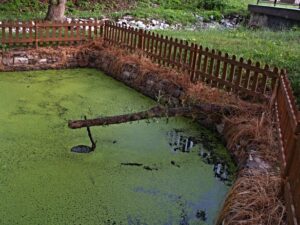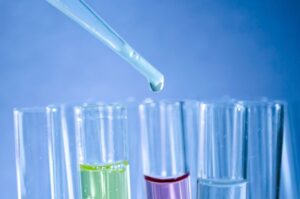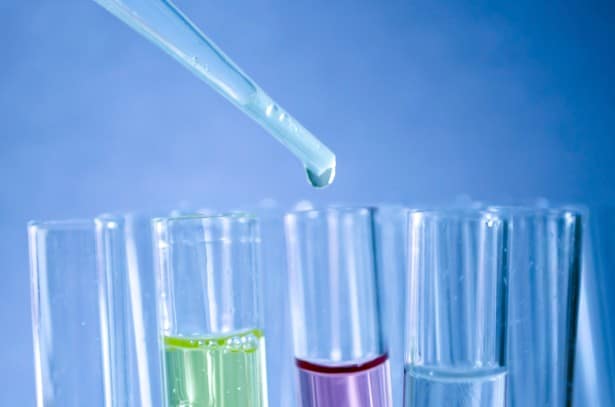There are many water quality parameters we test in order to determine fish health and many owners can be confused by the phosphate test included in many test kit packages. What does phosphate in fish ponds and tanks indicate for the health of your pond environment?
What is phosphate?
Scientifically-put, phosphate is the combination of the elements phosphorus and oxygen. (1 phosphorus atom to 3-4 oxygen atoms, depending on the charge.) It is found in various foods, including beans, lentils, nuts and bran cereals and is necessary for the formation of bones and teeth.
Where does phosphate come from?
Phosphate is found within the water added to your pond. It can be added naturally from rocks and other mineral deposits and is used to prevent metal dissolution from water pipes. Phosphate levels in fish ponds may vary depending on the water source, how the water is treated and from natural rock elements in your pond and along your waterway.
How does phosphate in fish ponds affect fish health?
Phosphate in fish ponds have ZERO effects on your fishes’ health. However, it can dictate how much algae you can expect to see.
Phosphate is a natural fertilizer for all types of algae (string, mat or cellular). The more phosphate you have in your pond water, the more algae you can expect to see. Without having to test your water chemistry, you can absolutely tell how much algae to expect simply by looking at your pond. Remember, algae bothers humans more than it does fish, and it is NORMAL to have some algae in your fish pond and tank.
Like Designer Paws Salon, for luxury pet grooming
Algae only becomes a problem when your levels are significantly elevated to start affecting your pH and oxygen levels. During the day, algae are photosynthesizing, turning carbon dioxide into oxygen, but after the sun goes down, they reverse to cellular respiration, converting oxygen back into carbon dioxide. High carbon dioxide levels can acidify your water and start to drop your pH. Provided your KH, or carbonate alkalinity, is high enough, your pH should not change much. If your KH is low (<50 mg/mL), your pond can have a what’s known as a pH “crash.” This can be very dangerous and possibly life threatening for your fish.
High algae loads can also steal oxygen from your fish. If you do not run your water features or aeration overnight, due to noise or power concerns, your pond will have a limited supply of oxygen. Yes, there is some surface diffusion, but it is not as powerful as waterfalls or air stones. Algae will beat your fish to the oxygen every single time.

So, it’s not really the phosphate you should be worried about, but the algae. And don’t expect your fish to consume your algae! Not only do they get little to no nutrition from it, but the algae will grow faster than they can eat it. Here is how to safely remove various types of algae without harming your fish.
How to lower phosphate levels in koi ponds
If your algae is manageable, you don’t need to worry about your phosphate levels. If you have lots of algae, test your water for both nitrate and phosphate. Both are algae fertilizer, but come from different sources. Nitrates come from the end of your nitrogen cycle, the conversion of ammonia waste into nitrite and then nitrate through beneficial bacteria. Phosphate comes from your water supply. Nitrates can be removed by doing water changes or cutting back on your fish’s protein levels. Growth and color-enhancing foods usually have higher proteins, which your fish may not need, depending on their life stage and purpose.
Phosphates will need to be treated more carefully. There are phosphate binding products out there, mostly for use with saltwater aquariums. Keep in mind that you don’t want to bind up all the phosphate, but bring your levels down. This may also require removing rocks that may be leaching additional phosphates into your water, but is very hard to test for.
Final verdict: don’t worry too much about phosphate. Yes, algae is a pain, but if you add fish with sunlight, a little algae is no big deal. High phosphate levels will not affect your fish in any way.


